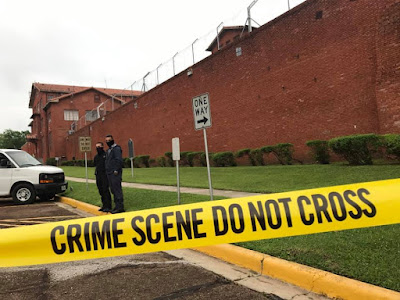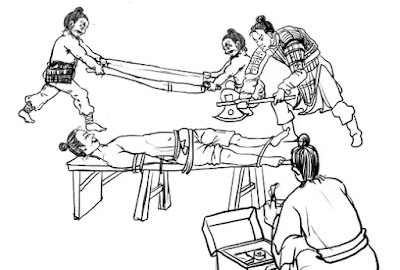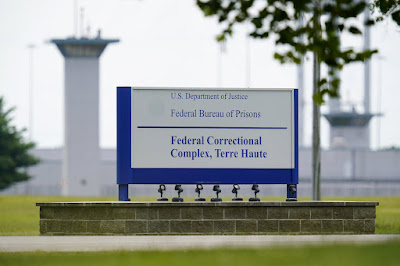 |
| Ohio's death chamber |
Rejecting Eighth Amendment challenges to the drug cocktail Ohio uses to give the death penalty, a federal judge moved the state one step closer Wednesday to resuming lethal injections.
The executions of Alva Campbell Jr., Gary Otte, Ronald Phillips and Raymond Tibbetts have been on hold since January, when U.S. Magistrate Judge Michael Merz found that the state's 3-drug injection protocol violated the Eighth Amendment.
Merz said that"'the use of midazolam as the 1st drug in Ohio's present 3-drug protocol will create a 'substantial risk of serious harm'" to the prisoners.
But the Sixth Circuit lifted the ban 2 weeks ago in a 8-6 en banc ruling, clearing the way for the state to move forward with the executions.
Ohio is scheduled to execute convicted murderer Phillips on July 26.
Otte and Tibbetts had tried to block their executions by raising 49 claims under the Eighth Amendment, asserting that the state will be "experimenting" on them by using an untested, lethal drug cocktail.
Judge Merz rejected each challenge Wednesday.
"Our revulsion from the so-called medical 'experiments' conducted by the Nazis and indeed from the notorious syphilis experiments on African-American men in this country has led to strict controls of medical experimentation, including the requirement of informed consent," the 60-page opinion states. "But that is not what defendants are engaged in, although they have appropriately considered the results of the use of particular drugs in planning future executions."
Merz dismissed the prisoners' other various claims related to the purported pain they will suffer during the execution, citing Sixth Circuit precedent that a prisoner has no property interest in a painless death.
Ohio's lethal-injection procedure came under national scrutiny following the botched execution of Dennis McGuire in January 2014.
As noted by Justice Samuel Alito when the U.S. Supreme Court upheld Oklahoma's execution protocol in the 2015 decision Glossip v. Gross, efforts to lobby against the death penalty have been widely successful in pressuring drug companies to stop selling the drugs used in the lethal-injection process to states for execution purposes.
As a result, the drug cocktail injected into McGuire's veins had never been used before.
Ohio ran out of pentobarbital, and instead used a mixture of midazolam and hydromorphone to sedate McGuire, before administering the next 2 execution drugs.
McGuire was not rendered unconscious by the midazolam, however, and the protocol left him choking and gasping for air for 25 minutes before he died.
Ohio has not carried out an execution since killing McGuire.
Source: Courthouse News, July 14, 2017
Opinion: Executions traumatic for prison employees
As a retired prison warden, I feel obligated to speak out as Ohio proposes restarting executions. While I read the Monday op-ed "Wrongful convictions make death penalty too risky" by Dale Johnston, I couldn't help but think how unfair this heavy execution schedule would be for corrections workers, even without the horrific risk of executing the wrongfully convicted.
The public should not ignore the fact that corrections staff are people who have dedicated their lives to serving the state. Performing so many executions would impose extraordinary and unnecessary stress and trauma on them.
Additionally, even before an execution takes place, these public servants are placed in a terrible paradox: After dedicating their professional lives to protecting the safety and well-being of prisoners and the public, they are then asked to participate in the death of a person under their care.
Finally, lethal-injection executions are very complex with little room for error. This exhausting execution schedule increases the risk of error. A problematic execution would add to the trauma already present for the corrections officers when they are tasked with carrying out a death sentence.
A better option would be to continue to use Ohio's supermax facility for inmates who present a threat to the public without resorting to executions.
Rex Zent
Dublin
Source: Letter to the Editor, The Columbus Dispatch, July 14, 2017
⚑ | Report an error, an omission, a typo; suggest a story or a new angle to an existing story; submit a piece, a comment; recommend a resource; contact the webmaster, contact us:
deathpenaltynews@gmail.com.
Opposed to Capital Punishment? Help us keep this blog up and running! DONATE!











.jpg)
